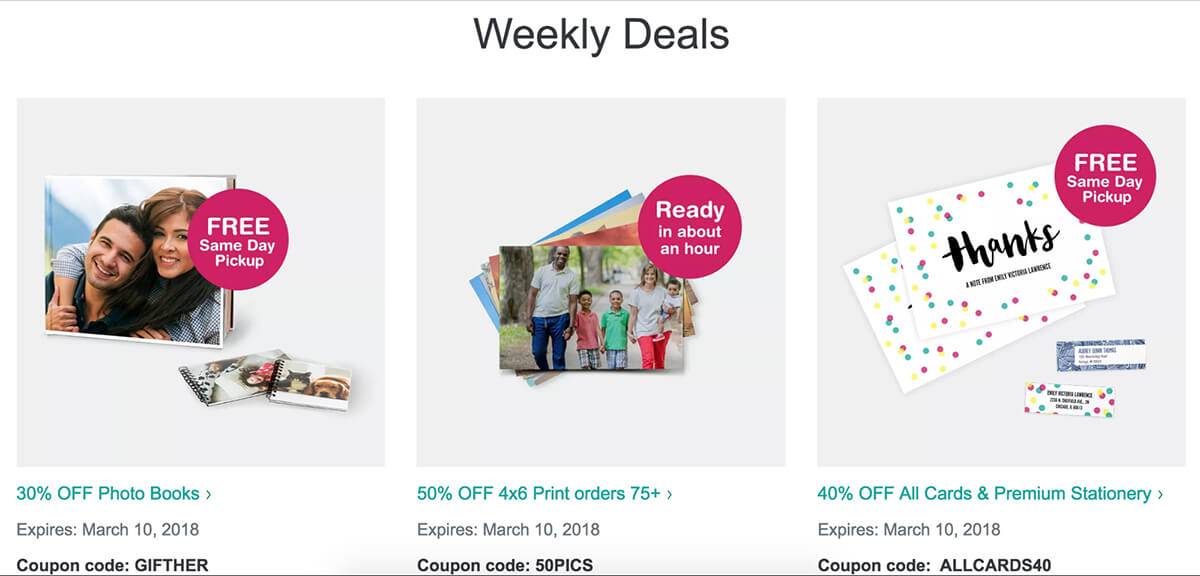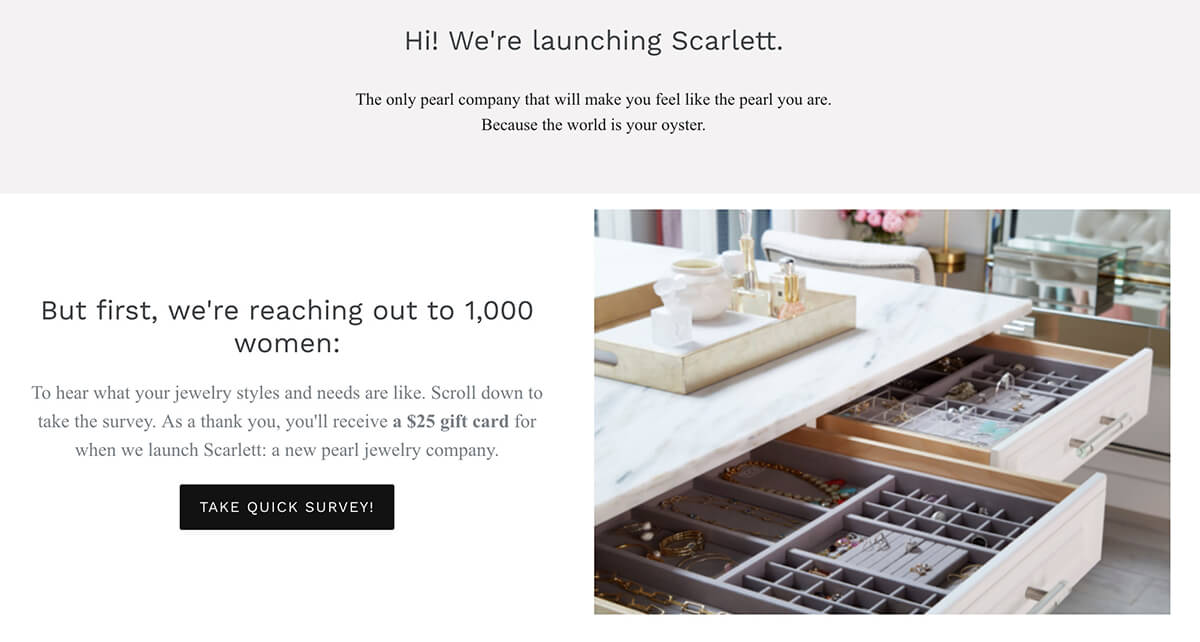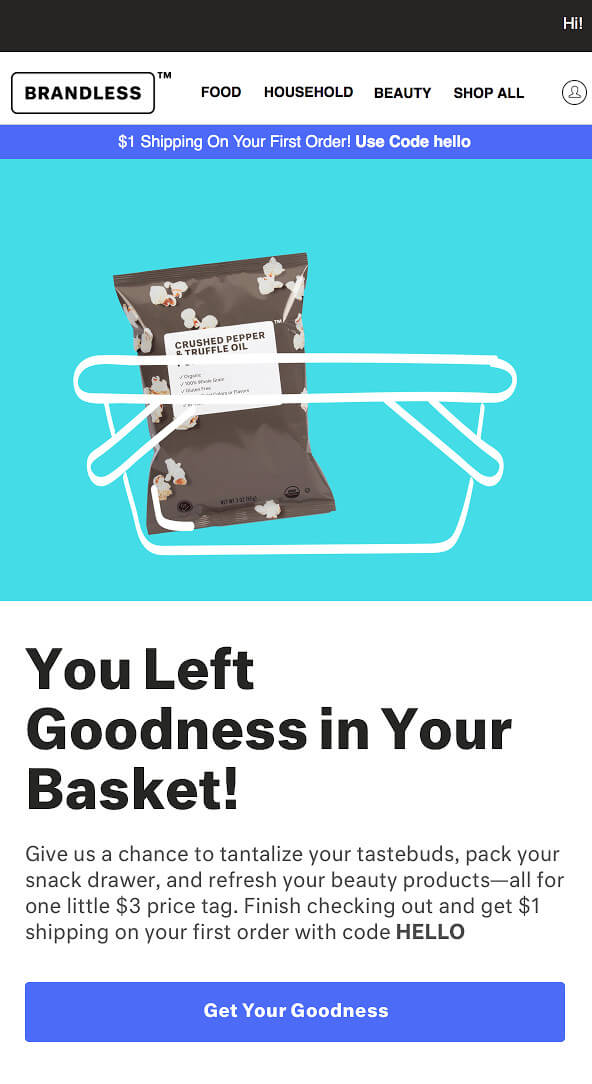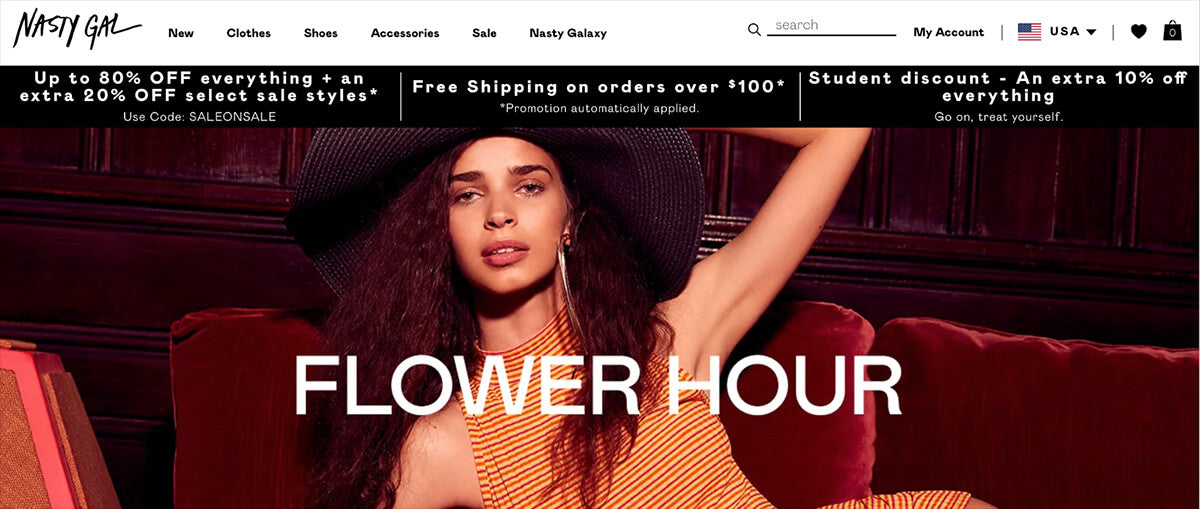Offers, coupons, discounts, and deals. There will come a time when most online merchants will be faced with the decision of whether to offer discounts, when to offer discounts, and how much the discounts should be worth.
Offering discounts for your online store can be a powerful weapon in your conversion arsenal to drive customer loyalty. But, used haphazardly, you can do significant damage to your brand or, worse, become unprofitable.
In this post, we’ll review some of the pros and cons of offering deals for your online store, look at some of the most popular ways you can use discounts to drive customer loyalty and conversions and, of course, how to most effectively use them.
💡 Note: For the purpose of this blog post and keeping things simple, we'll refer to coupons, discounts, and deals as "offers."
- The pros and cons of online store offers
- Who are offers, coupons, and discounts right for?
- Types of offers, coupons, and discounts
- How to use offers to drive sales and customer loyalty
- Make the most of your offers, coupons, and discounts
The pros and cons of online store offers
Before we jump into different ways you can effectively use offers to increase customer loyalty and acquisition, let’s first look at some of the pros and cons:
Pros of online store offers
- Easy and quick to implement natively in Shopify or using apps
- Easy to track with Shopify’s Discounts Report
- Increased customer loyalty
- Increased customer acquisition
- Increased conversions
- Quickly move stock
- Meet sales goals
Cons of online store offers
- Decreased margins and profitability
- Possible brand damage
- Decreased conversions outside of sale periods if you train visitors to wait for offers
- Tendency to drive non-loyal (price-driven) shoppers
- Tendency to reduce average order size
- Attract customers outside your target market

Free Reading List: Conversion Optimization for Beginners
Turn more website visitors into customers by getting a crash course in conversion optimization. Access our free, curated list of high-impact articles below.
Get our Conversion Optimization reading list delivered right to your inbox.
Almost there: please enter your email below to gain instant access.
We'll also send you updates on new educational guides and success stories from the Shopify newsletter. We hate SPAM and promise to keep your email address safe.
Who are offers, coupons, and discounts right for?
As mentioned previously, online store offers can be an effective tool for not only customer acquisition but also for customer loyalty. However, it’s important to consider your overall brand strategy before you begin offering discounts.
If you want to position yourself as a higher-end brand or if you have slimmer margins, you may want to consider sticking to customer loyalty offers as opposed to weekly sales. On the other hand, if you have healthy margins, deep discounting and daily or weekly sales might be better for hitting your goals.
Ultimately, you need to consider if offers and which type(s) of offers are right for your brand. Building an online business will generally involve a lot of experimentation to understand what works best. The best approach is to choose a goal for every campaign and offer, start small, and measure the results.
Types of offers, coupons, and discounts
There are several types of discounts and offers you have at your disposal. Let’s take a look at some of the most common:
Each of these can be offered in Shopify using two different types of discounts:
Percentage-based discount 📊
One popular way to offer discounts is through percentage-based discounts. This can include smaller incentive percentages like 5% or 10% off, larger discounts to really drive sales like 20% and 25%, or significant percentages like 50%+ to liquidate merchandise that’s old or isn’t moving. You can also easily apply these discounts to multiple collections, products, and locations in Shopify, or offer them based on a specific purchase, like “Buy two sneakers, get 50% off any sweater.”
Dollar value discount 💰
Dollar value-based offers can be positioned as a credit. This makes people feel like they’re wasting money if they don’t use it. Pair one of these with a minimum purchase amount to increase its impact, like “Spend $200, get $20 off.”.
An easy trick to keep in mind when deciding between a percentage or fixed amount discount for a specific product is the "rule of 100". If your item is less than $100.00, use a percentage discount; if higher, use a fixed amount discount. This is a psychological trigger that will result in the highest perceived value for your customers.
Free shipping 🚚
Shipping costs are one major reason for shopping cart abandonment. Offering free shipping is a great way to mitigate this and increase conversions.
Use free shipping in conjunction with a minimum purchase requirement to increase your average order value, which you can set up as a shipping setting in Shopify. You can even combine your free shipping offer with other seasonal promotions, like a 20% discount code for email subscribers, to increase the value of your offer.
Free gift 🎁
A free gift with a purchase can be a great way to provide additional value to customers. If used strategically, it can also be used to increase average order size and/or to get rid of product that isn’t moving. You can set a minimum purchase requirement or a volume requirement using a Buy X, Get Y discount in Shopify to offer a free gift for orders over $200, or once someone buys 5 items.
Automatic discounts ✅
Automatic discounts apply to every eligible cart, and customers see them on the cart page before they start the checkout process. It’s a great way to run a storewide promotion on a product, category, or on all of your products without making your customers enter a discount code.
Skipping the code can help encourage orders, and speed up checkouts too. In September 2019, U.S. customers who started checking out on Shopify with a discount already applied were 1.8 times more likely to place an order than without a discount, and they checked out 25 seconds faster with an automatic discount compared to a discount code.
Plus, when there’s already a discount applied to their cart, there’s no need for customers to leave checkout to hunt for a discount code—or email you because they couldn’t find the code you sent. All this adds up to smoother experience for your customers, and potentially higher conversion rates for you.
Discount codes ⌨️
Discount codes are codes that your customers enter during the checkout process to redeem a specific offer. They’re a tried-and-true way to offer discounts to the right people, whether that’s everyone on your email list or a specific segment like new subscribers or repeat customers.
Using discount codes can also help you track the success of your marketing efforts. If you’re running multiple campaigns, creating a separate discount code for each can make it easier to see the relative impact on sales.
How to use offers to drive new sales and repeat purchases
There are a hundred and one ways you can use sales, offers, discounts, and deals to drive customer loyalty, acquisition, and conversions.
- Weekly/monthly discounts
- Prelaunch offers
- Holiday and seasonal deals
- Abandoned cart offers
- Email/newsletter subscription offer
- Incentives for liking, following, and sharing on social media
- Referral promos
- First-time shopper offer
- Minimum purchase discount
- Exclusive social offers
- Customer loyalty offers
- Exit intent offer
- Retargeted promotions
- Influencer offers
- Customer loyalty program membership incentives
- Offers for purchasing online
- Coupons for purchasing in-person
- Event attendance offers
- Customer milestone discounts
Let’s take a look at some of the most popular options below, along with an example for each.
1. Weekly/monthly discounts
These are traditional sales used to drive conversions. Often, these sales are used at the end of a month or quarter to increase revenues to meet business goals.
Example: The online photo department at Walgreens has weekly sales and coupon codes, as well as ongoing promo codes at the bottom of the page.

2. Prelaunch offers
If you’re still in the prelaunch stage of your business or maybe even launching a new product, you can use prelaunch offers to drive traffic and pique interest, turning new customers into loyal customers.
Example: The Jewelry Wardrobe is using this approach with success. They’re offering free $25 gift cards in exchange for customers’ email addresses and time to fill out a brief survey. They kicked this initiative off by manually reaching out to potential respondents on LinkedIn.

3. Holiday and seasonal deals
Black Friday Cyber Monday and the holiday season are the big ones, but the whole year is sprinkled with national and commemorative holidays that provide an opportunity to share relevant discounts and offers with customers.
Example: Blu Skin Care regularly makes use of holidays to promote offers to their visitors and past customers. They promote these in different ways: email, social media, markets, and on their website.
4. Abandoned cart offers
With close to 70% of all people abandoning their carts, abandoned cart email offers can be a powerful tactic to bring those people back. Shopify natively has abandoned checkout recovery functionality built-in if you’re on the Shopify plan or higher. For everyone else, or if you want more customization and analytics, check out Klaviyo.
Example: Brandless, an online grocery brand that shuns all branded products, sends out abandoned cart emails along with a $1 shipping offer after cart abandonment. This reminds and incentivizes first-time visitors to come back and complete their purchase.

5. Email/newsletter subscription offer
Building an email list is extremely important for online retailers. By providing an offer in exchange for visitors’ email addresses, you increase the chance of a conversion. You also get their email, providing you with the opportunity to build a relationship, foster customer loyalty, and market to them in the future.
Example: Online retailer Overstock.com offers a coupon for 15% off your purchase for signing up to their newsletter.

6. Incentives for liking, following, and sharing on social media
One of the hardest parts of running a new online store is getting the word out. Giving visitors and customers an incentive to share your store with their social circles can be an effective way to create inexpensive word-of-mouth referrals.
Example: Truxx offers customers $5 off their next purchase in exchange for visitors sharing about the brand and experience on Facebook.
7. Referral promos
People are much more likely to purchase from you if referred by a friend or family member. Use this to your advantage and leverage offers to encourage referrals. You can choose to give a deal to the person referring, the person being referred, or both.
Example: Meal-delivery brands like Blue Apron and Hello Fresh are well known for their referral marketing. Every so often, customers are gifted promo codes to share with friends and family, who can then redeem their first box for free or at a steeply discounted price. For every friend who redeems, the referrer often gets a free or discounted box, too.

8. First-time shopper offer
Providing a first-timers offer could be just the nudge a first-time visitor needs to be converted to a paying customer.
Example: Clearly provides all new visitors with a 50% discount on prescription glasses, 15% on contact lenses and free shipping.

And DODOcase, an online manufacturer of iPad cases, offers 10% off your first purchase.

9. Minimum purchase discount
An offer based on the total value of a shopping cart is an effective upselling tactic to encourage customers to spend more, increasing your average order size. A strategic way to incorporate this into your online store is to calculate your average order value for the previous few months and offer a discount or free shipping on all orders 10% to 20% over your average order value.
You can also offer minimum purchase discounts for specific collections and products. If there’s a particular collection you want customers to focus on, try adding a minimum purchase discount to incentivize your audience.
Example: Popular online retailer Nasty Gal offers free shipping on all orders over $100.

10. Exclusive social offers
Exclusive offers on your social networks can be a great way to build customer loyalty with those who follow you. Plus, this tactic provides a reason for new people to follow and subscribe to your social channels, which will allow you to market to them in the future as well.
Example: Online natural skincare retailer Maple Holistics has shared offers specific to social media. In the example below, they offered Twitter followers a code for 15% off all Amazon orders.
Love Is In The Hair! Maple Holisitcs is celebrating Valentine's day with our true love: You! We love our incredible customers. Use the code: LOVEMAPE on Amazon & enjoy 15% off on all our incredible products. Spoil yourself, you deserve it! RT + Tag friends to share the #love! pic.twitter.com/QHOpfRr6SF
— Maple Holistics (@MapleHolistics) February 12, 2018
11. Customer loyalty offers
Rewarding customer loyalty can build an even stronger bond while also only providing discounts to customers who already spend money with you. You can easily make discount codes exclusive to specific groups of customers with Shopify.
It can be as simple as sending your best customers a personal email with a discount or credit, using an automated email marketing app like Klaviyo to send email offers when someone makes a certain number of purchases, or implementing a customer loyalty program like LoyaltyLion.
Example: One of the major customer loyalty tools behind the success of outdoor shop REI is its co-op membership program. Members receive 10% back on all full-price purchases in the form of a dividend, plus receive access to exclusive sales. REI also frequently rewards members for purchases, such as this free $20 gift card with a qualifying $100+ purchase.

12. Exit-intent offer
Sometimes all it takes to convert a visitor to a customer is a last-second offer before they leave. An exit-intent offer will pop up just as your visitor is about to leave your site or close the tab, presenting them with a final offer to purchase.
Example: Auto Accessories Garage displays an offer for their exit intent pop-up. They offer a percentage-based discount if you enter your email address into the form. If users abandon the shopping cart after that, the brand sends an abandoned cart email with an even bigger discount to further persuade shoppers to convert.

13. Retargeted promotions
Retargeted offers are effective because they’re only shown to people who have been on your site before. That means that they already know who you are. The ads serve as a reminder to come back, and the offer serves as a nudge to purchase.
Example: Again, we have DODOcase as an example. They effectively use offers several times throughout the buying cycle to convert visitors into customers. In this case, DODOcase targets visitors to their site on Facebook and Google Ads with retargeted ads that provide 20% off if they come back to purchase.

14. Influencer offers (bloggers, celebrities, etc.)
Partnering with influential people that have large audiences is a great way to increase exposure to your brand. And by providing an exclusive offer to the influencer’s network, you’re more likely to convert their fans to your customers.
Example: BarkBox is a monthly subscription service for dogs and their humans. They frequently collaborate with furry influencers to build brand awareness and drive sales. To encourage people to convert after seeing the posts on social media, BarkBox provides influencers with a unique offer code to share with their specific audience.
This unique code also allows BarkBox to monitor and track redemption so they know which influencers were most effective for future campaigns.
15. Customer loyalty program membership incentives
Rewarding customers for joining your customer loyalty program is an ideal time to share a bonus incentive. This not only rewards customers for engaging with your brand, but it also gives them more motivation to sign up for the program in the first place.
If you don’t already have a customer loyalty program in place, it might be time to reconsider. According to a report by Forrester, customers who belong to loyalty programs spend $42.33 more over the course of three months.
Example: Big Lots offers $5 off your next purchase when you join their Big Rewards customer loyalty program. Customers can redeem the reward online or in-store.

16. Offers for purchasing online
If you want to drive online sales, consider incentivizing online purchases. Whether you want to use your ecommerce site to supplement your brick-and-mortar sales or create a customer base outside of Amazon, you can drive online conversions by offering something in return.
Example: Dick’s Sporting Goods incentivizes the buy-online-pick-up-in-store with a special offer for customers on their homepage. Their goal is to get customers to convert online and come to the store to pick up their purchases. This allows the brand to create an in-person experience for the online shopper, as well as a way to cross-promote other products while the customers are in-store.

17. Coupons for purchasing in-person
Just as you can drive online sales with offers, you can also drive in-person sales. This can be at your brick-and-mortar location, if you have one, or at in-person events, such as festivals, fairs, expos, trade shows, etc.
Example: Bed Bath & Beyond is known for sending out coupons with discounts for in-store purchases. They often accept these coupons even after the expiration date.

18. Event attendance offers
If you host events, in-person or virtually, you can reward attendees with discounts or free gifts. These discounts can be given during the event or after the event. This helps to continue to nurture the relationship with engaged customers and drive more customer loyalty. Plus, it’ll likely encourage attendance for your next event.
Example: We’ll look at a retail example for inspiration here: prAna’s Boulder retail location hosts free yoga classes in their store almost daily. After class, students are invited to shop upstairs and enjoy a 25% discount on their in-store purchases. If they want to drive online sales, prAna could just as easily provide yoga students with a promo code to redeem the offer during their next online purchase.
19. Customer milestone discounts
If you have a customer loyalty program, customer milestones are especially important. These milestones could be personal to the customer, such as a birthday or anniversary. Other milestones can celebrate the relationship you’ve built with one another. Those would include the anniversary of the customer’s first purchase or date they joined your customer loyalty program, spending a certain amount of money, making a certain number of purchases, or various engagements with your brand.
Example: Again, Big Lots rewards customers on their birthdays with extra discounts and free gifts. They let customers know before they join the customer loyalty program about these perks, which gives users an extra nudge towards joining.

Make the most of your offers, coupons, and discounts
Offers and discounts aren’t right for every online business. If you start with a clear goal in mind, a firm understanding of the brand, and a willingness to experiment, you can most effectively use offers to meet your objectives, build customer loyalty, and increase revenues.
Tell us in the comments which offers have worked best for your online store when it comes to driving sales and customer loyalty 🏷️
Further reading:
- Ecommerce Marketing Essentials: 17 Actionable Tactics to Drive More Sales
- How to Get Your First Sale in 30 Days
- The Beginner's Guide to Setting Up an Affiliate Program
Illustration by Eugenia Mello.

